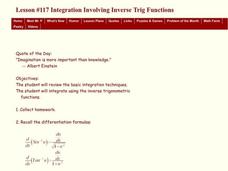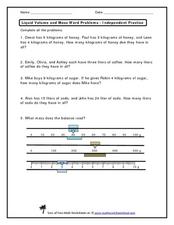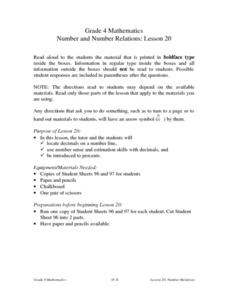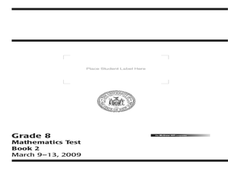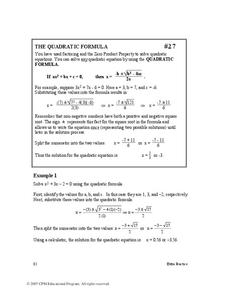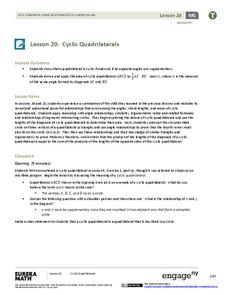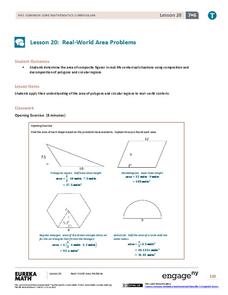Curated OER
Subtract Monomials
In this monomial subtraction worksheet, students must apply the properties of combining like terms accurately. There are ten subtraction equations.
Curated OER
Using Equations to Solve Problems
In this algebra instructional activity, students apply their knowledge of solving equations to solving word problems. There are 9 questions with an answer key.
Curated OER
Integration Involving Inverse Trig Functions
Students review the steps for integration and solve equations using integration by parts. In this calculus lesson plan, students apply their knowledge of integration to inverse trig function. Students review their trig and inverse trig...
Curated OER
Lines of Fit
Students graph an equation and analyze the data. In this algebra lesson, students graph scatter plots and identify the line of best fit using positive correlation, negative correlation an d no correlation. They apply their data analysis...
Curated OER
Quadratics with Irrational Solutions
In this algebra worksheet, students apply the concepts of a right triangle to help them solve for the missing sides of a triangle. They use the quadratic formula to solve word problems. There are 5 problems with an answer key.
Curated OER
Picking Chips: Experimental Probability
Students apply the concepts of an event occurring to playing a game. In this probability lesson,students differentiate between experimental and theoretical probability.
Curated OER
Himalayan Herds: Fractional Exponential Growth
Students solve problems by identifying exponential growth and decay and differentiating between patterns, relation and functions. In this algebra lesson, students apply concepts of exponential growth to solve problems.
Curated OER
The Pythagorean Theorem
In this geometry worksheet, 10th graders apply the Pythagorean Theorem as they determine the length of the missing leg or hypotenuse in right triangles. The one page worksheet contains twelve questions. Answers are...
Curated OER
Be a Problem Solving Star
Third graders observe a math problem and discuss what it is and what they should do with it. They are introduced to the STAR steps for problem solving and discuss how to use it to answer math problems as well as incorporating some of the...
Curated OER
Liquid Volume and Mass Word Problems
As your scholars become comfortable with liquid mass and volume units, give them these addition and subtraction word problems to help apply the skill. There are no conversion or fraction skills involved. After solving four word problems,...
Curated OER
Adding and Subtracting
Students will add and subtract numbers less than 100 as well as understand and use the inverse relationship between addition and subtraction. They compose/decompose numbers up to 10 and understand a variety of situations in which...
Curated OER
Express Whole Numbers as Fractions
These real-life scenarios are a good way to get your scholars thinking about applying fractions. They employ equivalent fractions and simplification in their answers, matching each question to one of the fractions on the right. Consider...
Curated OER
Applied Maximum Minimum Problems--Mini Golf
Twelfth graders investigate maximum and minimum as it relates to billiard and mini golf. In this calculus lesson plan, 12th graders review how to find the maximum and minimum and write proofs to show how they arrive at their answer. They...
Curated OER
Number and Number Relations: Lesson 20
Fourth graders locate decimals on a number line. They use number sense and estimation skills with decimals. Students are introduced to percents. They look at fractions on a number line. Students fold a piece of paper to find halves,...
Curated OER
Transportation Math
Sixth graders solve transportation themed word problems. For this word problem lesson, 6th graders solve transportation themed word problems using critical thinking skills.
Curated OER
New York State Testing Program Math Release questions grade 8
In this algebra and geometry worksheet, students solve seven varying math problems. This worksheet will help prepare students for standardized tests covering algebra and geometry.
Illustrative Mathematics
Running at a Constant Speed
The learner must use the given constant speed to find the unit rate. A table is made in order to relate the speed to the time and the distance. From the table, learners are able to see the unit rate in miles per minute and miles per...
Curated OER
The Quadratic Formula
In this quadratic formula worksheet, 9th graders identify and solve 20 different problems by applying the quadratic formula to each one. First, they read the lesson and examples to identify the quadratic formula. Then, students use the...
Curated OER
Laws of Exponents
In this laws of exponents worksheet, 9th graders identify and solve 20 different problems that include applying the laws of exponents to each problem. First, they define base, exponent and value in relation to the laws of exponents....
Curated OER
Time and Timetables
In this recognizing time and timetables worksheet, students compare Julian and Gregorian calendars, determine leap years, and apply the formula for finding the day of week and Easter day for any year. Students solve 20 problems.
Curated OER
Worksheet 3.1 Functions
Middle and high schoolers complete and solve 12 various types of problems. First, they express the output as a function of the input in each table. Then, pupils evaluate for the given variable when the value is as stated. In addition,...
EngageNY
Cyclic Quadrilaterals
What does it mean for a quadrilateral to be cyclic? Mathematicians first learn what it means for a quadrilateral to be cyclic. They then investigate angle measures and area in such a quadrilateral.
Inside Mathematics
Swimming Pool
Swimming is more fun with quantities. The short assessment task encompasses finding the volume of a trapezoidal prism using an understanding of quantities. Individuals make a connection to the rate of which the pool is filled with a...
EngageNY
Real-World Area Problems
Not all structures take the shape of a polygon. The 21st lesson in a series of 29 shows young mathematicians they can create polygons out of composite shapes. Once they deconstruct the structures, they find the area of the composite figure.




